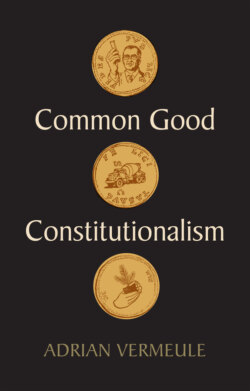Common Good Constitutionalism

Реклама. ООО «ЛитРес», ИНН: 7719571260.
Оглавление
Adrian Vermeule. Common Good Constitutionalism
CONTENTS
Guide
Pages
Common Good Constitutionalism. Recovering the Classical Legal Tradition
Acknowledgments
Introduction: The Return of the Classical Legal Tradition
Rational Ordering for the Common Good
An Interpretive Argument
The Common Good Defined
The Role of Prudence
Determination – Of the Constitution and Within the Constitution
General and Particular Claims
Courts and the Common Good
Abuse of Power?
The Common Good and “the Common Good”
Competitors to the Classical Tradition
Vices and Virtues
Shibboleths Dispelled
Plan of the Book
Scope and Ambitions
Notes
Chapter 1 The Common Good Defined
Antonyms of the Common Good
The Positive Common Good in Politics and Law
The Common Good in Law
A Framework, Not a Blueprint
Common Good Constitutionalism
Moral Readings of the Constitution
Who Decides?
A Note on “Democracy”
The Constitution of Risk and “Abuse of Power”
Notes
Chapter 2 The Classical Legal Tradition in America
American Law as Classical Law: An Overview
Lochner v. New York
Due process, determination, and the common good
Lochner and the common good
Progressives and libertarians
Comparison to modern approaches
Arrogance and skepticism
Riggs v. Palmer
Two versions of textualism
Epikeia
The opinions
Curtiss-Wrightand theIus Gentium
The Classical Tradition as Our Law
Notes
Chapter 3 Originalism as Illusion
Context of Discovery
Context of Justification
Dworkin’s Critique
Living Originalism
Examples
Independent agencies
The Electoral College
The Title VII debacle
Hybrid Views
Notes
Chapter 4 Progressive Constitutionalism and Developing Constitutionalism
The Liturgy of Progressive Constitutionalism:Obergefelland Its Aftermath
Instrumentalized Law
Developing Constitutionalism
Newman and the Development of Doctrine
A Model Opinion
Human Rights Without Progressivism: A Model Declaration
An Anti-Model
The core of marriage
Notes
Chapter 5 Applications
A. The Administrative State: The Living Voice of the Law
Rules, commands, or principles?
Arbitrary and capricious review
Administrative procedure
Reviewability and fundamental principles
Deference and determination
B. Subsidiarity and Solidarity: “A Giant’s Strength”
Subsidiarity as a state of exception
State sovereignty?
Prudence, subsidiarity, and solidarity
C. Rights and the Common Good
The classical view of rights
Environmental rights
Notes
Conclusion
Notes
Index. A
B
C
D
E
F
G
H
I
J
K
L
M
N
O
P
Q
R
S
T
U
V
W
Y
Z
POLITY END USER LICENSE AGREEMENT
Отрывок из книги
“Elegant, insightful, magisterial: Adrian Vermeule has written an instant classic of scholarship, exposing the poverty of today’s prevailing legal theories, left and right, and pointing us to a better alternative – one as vibrant and radical as the Western tradition.”
Sohrab Ahmari, author of The Unbroken Thread and From Fire, by Water
.....
In America, the classical tradition held that so long as determinations are made within the jurisdictional competence of public bodies, for legitimate ends, and on rational grounds, they are a matter for the public authority, not the courts. A strong legal principle of deference by courts to the determinations of legislatures was part and parcel of our law from the beginning. One of my particular claims is that our small-c constitutional order developed over time to extend this principle to the institutional presidency and administrative tribunals. Today our constitution supports the legitimacy of broad delegations to the executive,24 shaped and constrained by principles of legality that ensure that the executive acts rationally in ways ordered to the common good.25 Determination is plausibly the remote ancestor of deference in all sorts of forms that are familiar in the administrative state, such as Chevron deference26 to administrative agencies.
A corollary of the nature of determination is that the public authority – including the executive exercising delegated authority – may, without transgressing its boundaries, engage in what I have called “rationally arbitrary decisions.”27 Because determination involves specification within a range in which reason need not yield a unique answer, some element of irreducible judgment will be required. Should the statute of limitations for a given offense be ten years or fifteen? Or perhaps twelve? The law is not so sophomoric as to demand a first-order reason for the choice of one particular number over another, for it is impossible to give any such reason, at least within a reasonable range of choices. In this sense, reason itself allows a certain degree of arbitrary specification, which will thus not be coded as “arbitrary” in the legal sense for purposes of the common good framework.
.....